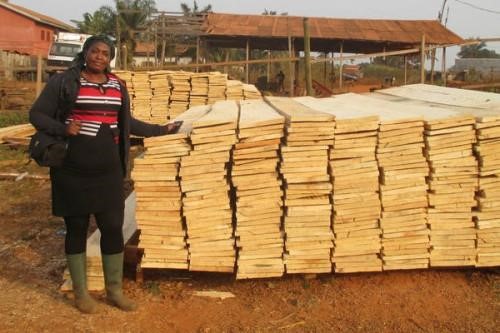United Nations FAO Boost Cameroon’s Small Timber Businesses To Discourage Illegal Trade

The United Nations Food and Agriculture Organisation (FAO) through its FAO-European Union Flegt programme, has helped Cameroonian small and medium-sized enterprises to source 2,000 square metres of legal timber for domestic consumption between 2019 and 2020.
The programme which was launched in 2016 is intended to ensure that local markets are provided with only legally acquired timber.
To have attained this level of success, various projects financed by the FAO-EU Flegt programme were initiated, and cooperation was formalised between the small and medium-sized enterprises and providers of legally sourced timber in Cameroon. To this effect, thirteen supply contracts were signed between small operators and holders of forestry licenses (communal and community forests) between 2017 and 2020.
Memoranda of understanding were also concluded between certain small and medium-sized enterprises and some timber industrialists for the supply of legal timber in collaboration with the Groupement de la Filiere Bois au Cameroun – Timber Industry Group of Cameroon – (GBC) and the Cameroon Federation of Associations and Professionals of the Second Transformation of Timber popularly known by its French acronym FECAPROBOIS.
A local timber dealer in New Town, Limbe market who gave his name as Simo George had this to say about the legalised timber programme he benefited from: “The problem with the legalised timber is that it costs more while illegal timber is cheaper. Hence customers find it difficult to understand when we charge higher for the same kind of timber. All the same, when we sell the illegal timber, we are harassed by forest guards who take bribes from us. I am not saying they don’t take bribes from us when we sell legalised timber,” said George.
According to the FAO, the FAO-EU Flegt programme will continue to support the private sector in Cameroon to reinforce putting in place a voluntary partnership accord for the application of forestry regulations in governance and commercial exchanges. The agreement was signed in October 6, 2010, between Cameroon and the European Union and ratified on August 9, 2011, by the state of Cameroon.
Support Our Journalism
There are millions of ordinary people affected by conflict in Africa whose stories are missing in the mainstream media. HumAngle is determined to tell those challenging and under-reported stories, hoping that the people impacted by these conflicts will find the safety and security they deserve.
To ensure that we continue to provide public service coverage, we have a small favour to ask you. We want you to be part of our journalistic endeavour by contributing a token to us.
Your donation will further promote a robust, free, and independent media.
Donate HereStay Closer To The Stories That Matter




